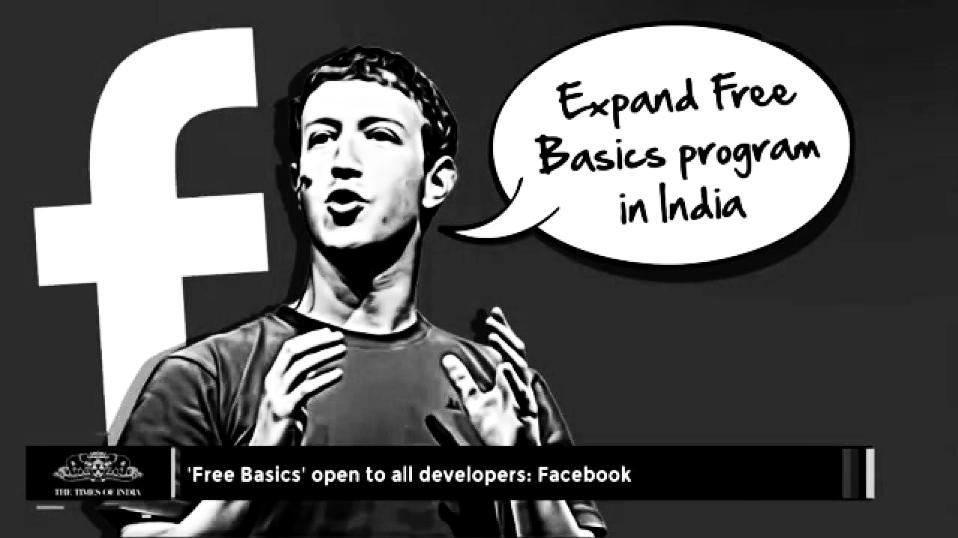Free basics for india? really?
Free basics in India

The Free Basics initiative by Facebook to provide free internet services to people in order to ensure the so called “Digital Equality” is being condemned by the Net Neutrality Activists. The typical criticism of this scheme has been that it violates principle of net neutrality but there are other questions which are to be raised before sanctioning Free Basics. First, does India have the required infrastructure to implement this scheme efficiently so that it uplifts the poor? Second, Whether Free Basics will be beneficial for our economy or it will hamper our economy by discouraging start-ups which are backbones of Economy of developing countries?
Lack of Infrastructure to implement ‘Free Basics’.
According to Rangarajan Committee Report published in 2015, a staggering 363 million people constituting 29.5% of the Indian population live below poverty line. This translates that they were spending less than Rs.32 in rural areas and Rs.47 in urban areas on a daily basis. Nearly, one-third of India’s population does not have access to electricity. Even though we have less than 5% of world’s population, we are home to 40% of world’s population without electricity. Only 30% of our population can read or write in English. Still more than quarter of our population can’t read or write in any language. Also only 26.3% out of total mobile phone users have smartphones. Ironically, Facebook expects a person earning Rs.32 per day to afford a Smartphone and even sustain it without electricity. Also the question arises, whether it will be of any help to 70% of our population which can’t understand English (Language used by most of the apps and websites). I completely concur with the fact that the statistics are not the best way to put forth a picture, but they do provide an overview in this case that the initiative is an untimely one. Prior to internet, Indian population should be able to afford a Smartphone which can be sustained through proper access to electricity and also they should have access to primary education which can help them in dealing with the complex nature of Smartphones and Internet. Comprehensive study named ‘Offline and falling behind: Barriers to Internet adoption’ conducted by Mckinsey & Company elucidates that approximately 900 million offline people around the globe are illiterate.
Hampers the growth of start-ups
The start-up owners like Vijay Shekhar Sharma, founder of Paytm have not only condemned the scheme on personal level but have also endorsed the campaigns against Free Basics. The reason is very clear that if Facebook succeeds in its initiative, it will not only act as a gatekeeper of Internet violating its very own principle of Neutrality and open access but it will also hamper the growth of start-ups in the country. For instance, If E-Recharge facility is provided by an app named FB-PAY available under Free Basics initiative which charges the same as Paytm, the free app will capture the whole market of Paytm as it is highly unlikely on one’s part to pay for something which is already available free of cost. The condition can be much worse in case of first time internet users as it is highly probable that they will never get to know about Paytm as for them FB-PAY will be synonymous to E-Recharge in the same way Maggi is synonymous to noodles in our country.
Flaws in the alternate model
The activists also came out with some alternate model to provide free internet. One of them was to give fixed data like 250MB per month to poor people without any restrictions (as providing it to everyone is quite impractical). But the problem arises in identifying ‘who is poor’. As in the times gone by, Indian middle class has accrued more benefits from subsidies for the poor than the poor himself. The other proposed models like one enforced in Bangladesh by Grameenphone which provides data for watching videos especially advertisements, have their own limitations. As the service provider might impose certain ideologies on the naïve population through these videos by showing them only one side of the coin. Also some advertisements can be very offensive to certain sections of the society. For example, commercials made by cosmetic companies showing the advantages of being fair are highly racist.
Behind this veil of philanthropy, Facebook has its own hidden agenda. As Data is the New Oil of Digital Economy, the core aim of this initiative is to capture the Oil of 21st century as the Indian poor is so poor that he can’t afford to avail the advantages of this service. In pretence of human emancipation, Facebook is trying to colonise the Internet by acting as gatekeeper. On the other hand, the activists like Paytm and Paypal are not only trying to protect their own commercial interest but also they are trying to save the country from ‘Digital Colonization’.
It is woeful to know that the discourse has nowhere been to enable the poorest of poor to gain the benefits of this digitization. The government in cooperation with some of these cyber-giants can provide the poor, access to digital education and also increase digital and electrical connectivity across the country. As the poor of our country is so poor that he needs to be uplifted, so that schemes like these can be implemented. Also if preferential treatment is to be done, it can be done to promote websites like ‘Kisan Helpline’ and other such initiative to help the poor population to earn their livelihood better. Also internet centers can be established in villages to help the rural population in availing benefits arising out of the Internet.
(The writer is a student at NALSAR, Hyderabad)



